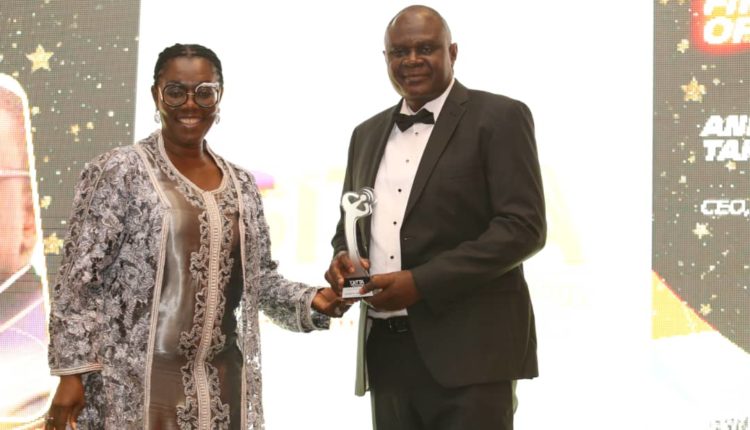Ghana’s Communications and Digitisation Minister, Mrs. Ursula Owusu- Ekuful has been awarded as the Digital Leader of the Year at the 2021 edition of the Ghana Information Technology & Telecom Awards (GITTA) for her tireless efforts and contributions to the transformation of the country’s digitalisation agenda.
The awards ceremony which happened last Saturday at the Mövenpick Ambassador Hotel in Accra celebrated the Ablekuma West lawmaker for her impeccable role in driving digitization in Ghana bringing into reality several initiatives and innovation within Ghana’s digital space.
This year’s ceremony, marking the 11th edition was themed: “Rewarding and Promoting Excellence in Digital Innovations”.
It brought together top decision-makers in the digital sector with the aim of promoting and inspiring innovation in the country’s ICT industry.
The awards ceremony recognized digitization across all sectors, including the public sector, banking, telecommunications, ICT, manufacturing, agriculture, health, and all other sectors involved in digitization.
Transformation
Delivering the welcome address with the main focus on the future of Ghana’s digitisation, the sector Minister said the New Patriotic Party (NPP) since voted into power in 2017 has used technology to formalize the economy for growth and sustainable livelihoods, to modernize government processes and service delivery, drive innovation, entrepreneurship, create jobs, transform businesses among other great initiatives which has resulted in the country’s digitasation agenda at such high climax.
“Since the NPP took office almost 5 years ago, the President of the Republic, Nana Addo Dankwa Akufo Addo, has been implementing his vision of a massive transformation of Ghana through technology as we vigorously pursue the Digital Ghana Agenda systematically. We are using technology to formalize our economy for growth and sustainable livelihoods, to modernize government processes and service delivery, drive innovation, entrepreneurship, create jobs, and transform businesses.”
She added, “Ladies and Gentlemen, the key pillars underpinning our digitalization include broadband and last mile infrastructure, Digital financial services, Digital entrepreneurship (i-hubs, economic activity and new jobs), Digital platforms (E-ID, address systems, Common Platform, data sharing, cyber security) and Digital skills.”
High Process
She disclosed government strategy measures in solving the issue of rural connectivity which has become a menace over a long period by connecting some 4 million citizens to the voice and telephony services in the remotest parts of the country.
She underscored the importance of investment in infrastructure saying it will improve access to the latest technology; result in greater availability of affordable and reliable broadband connectivity and broader adoption of digital technologies.
“We are also in the process of implementing a rural connectivity project to link the unserved and underserved areas of the country within the next few years. Some 4 million citizens will be connected to voice and data telephony services in the remotest parts of our country. Smart investment in infrastructure will improve access to the latest technology, result in greater availability of affordable and reliable broadband connectivity and broader adoption of digital technologies across the entire country as we are determined to promote digital inclusion and leave no one behind.”
She further indicated, “The digitization of the Ghanaian economy through the implementation of these few initiatives is already yielding fruits. The extensive mobile coverage in the country has generated a quantum leap in the use of mobile money transactions. Many of our rural folks have embraced mobile technology as a fast and reliable mode of transacting and paying for services in the comfort of their homes. Broadband access and its affordability is a means of growing the use of these digital services. Online education, remote working, virtual offices, online meetings and conferencing, telemedicine etc have become or are becoming the new normal in this covid era, all powered by digital technology. A connected country will make these services accessible to all and we are determined to build the digital infrastructure to enable this transformation succeed.
“The opportunities for our teaming youthful population are countless. The digital era provides the platform to breed entrepreneurs with the capabilities of developing innovative applications, solutions and efficient use of Smart phones. We are focusing on developing the digital skills of our youth to create the critical mass needed to man the exciting digital initiatives being implemented. We want to grow the software industry in Ghana to be able to develop home grown digital solutions by Ghanaians and for Ghanaians.”
Her Initiatives
Madam Ursula Owusu since assuming office in 2017 has birthed initiatives such as the Girls in ICT Initiative, the E-transform project which is rehabilitating 25 selected post offices to provide e-services, Rural Telephony and Digital Inclusion Project, setting up of ICT laboratory centres across the country and many more.
Her role in the establishment of Ghana’s National Cyber Security Centre in 2018 has also been commended, as it recently led to Ghana’s cybersecurity being rated as number three in Africa by the International Telecommunications Union (ITU) on its Global Cybersecurity Index (GCI). This is a major leap from the 11th position attained in the previous rating of 32.6 percent in 2017 and 43.7 percent in 2018.


Comments are closed.